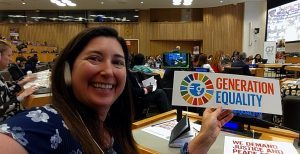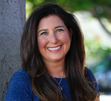Ms. Magazine: Searching for Gender Equality at the United Nations Conference

Thank you to Ms. Magazine and Carmen Rios for the honor of attending United Nations GA 74 and the United Nations Women’s Meeting in New York City, as well as for publishing my article: “25 Years After Beijing, What’s Next for Women Worldwide?”
[image error]
Twenty five years ago, in 1995, thousands of women gathered in China to attend the NGO Forum on Women and the UN’s Fourth World Conference on Women. It was a challenge for women to get visas, but over 30,000 women from 200 countries were in attendance—and the Beijing Declaration and Platform for Action, an agenda for women’s rights and empowerment, was created. At that historic convening, 68 countries made commitments to recognizing women’s rights as human rights.
Last year, UN Women Executive Director Phumzile Mlambo-Ngcuka, together with Nobel Prize Laureates Nadia Murad and Denis Mukwege, presented the report of the G7 Gender Equality Advisory Council to world leaders in Biarritz at the G7 Summit in France. UN Women also convened activist and political leaders in New York City last September for an event called “Gender Equality: from the Biarritz Partnership to the Beijing+25 Generation Equality Forum.”
[image error]
“I am honored to be with the women of the world who will provide leadership for this important and historic event,” then-UN Women Executive Director Phumzile Mlambo-Ngcuka told the crowd in New York. “Without a strong feminist movement, no country has a chance for a meaningful equality.”
There are 2.5 billion women and girls on this planet who are impacted by discriminating laws and lack any legal protection. In many countries, as much of 75 percent of the rights of women and girls are not protected in law. “We need all stakeholders to work together,” Mlambo-Ngcuka urged. “We need the whole world to agree and adopt a plan for massive change that we can implement together in our places of work, in our schools, in our government, in our homes and in our communities.”
Sweden’s Minister of Foreign Affairs, Anne Linde, explained how systemic bias puts women at risk—economically, socially and even physically. In 104 countries, there are laws preventing women from carrying out certain jobs. When it comes to a car crash, there is a 47 percent higher risk of women being severely hurt, because the car crash dummy is made with a male body. In 45 economies, there are no laws protecting women against violence in their own home.
[image error]
“When some countries say that women should dress differently, behave differently, live differently—our response is let women and girls decide for themselves,” Linde observed. “Women choose their own lives and the world will be a better place. How do we do it?”
Of course, she knows the answer to her own question: “by making sure that women get a seat at the table; by supporting women’s organization by proving that female participation in labor market increases economic growth; by fighting child marriage, female genital mutilation and the use of sexual violence as a weapon; by refusing to let anybody else decide what we do with our bodies and with our lives.”
We Said Go Travel
We Said Go Travel is a global community of over sixteen hundred writers with articles from every continent.
Stories are shared with photos and video from a perspective of the transformative power of travel. We Said Go Travel has hosted live and online events as well as travel writing contests around the world. ...more
- Lisa Niver's profile
- 57 followers




